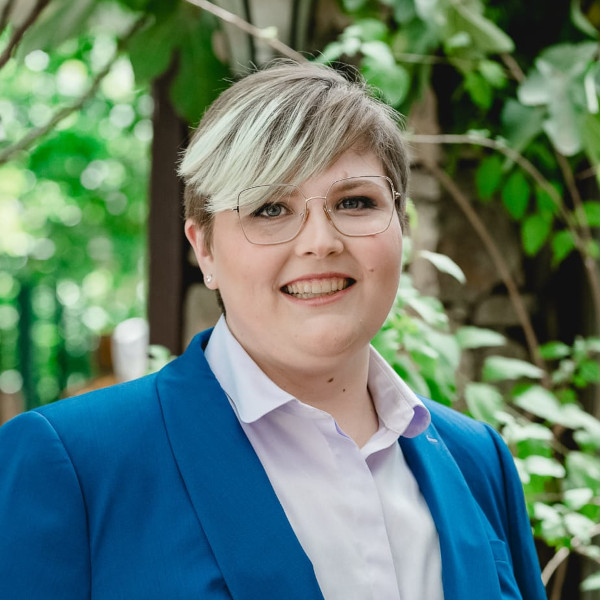Interviews with Olim
Each month, we interview an oleh or olah for our newsletter.
We invite you to read the stories of LGBTQ+ people who have made Israel their home.
"It makes the most sense for me to be in Israel."
Interview date: April 2022
Q. Where were you born and where did you grow up?
A. I was born in Palo Alto, California and lived there till I was 11. My family made Aliyah to Ramat Bet Shemesh then and I grew up there.
Q. At what age did you come out? And how did it go?
A. I came out in late 2018 when I was 23. I was in a midrasha as a gap space before starting uni when a friend asked me when I came out and I was like “what are you talking about?” Then sitting with myself for a week or so, I was like “oh, this explains all those confusing feelings I couldn’t put a label to.” It was a hard and confusing process to kind of breakdown all of my history, but putting it back together, it felt really good to have a deep understanding of myself.
I ended up coming out to my mom about a week after I came out to myself. I’m not really good at secrets – I hate them. She reacted like any religious mom would – she didn’t disown me but was really upset and threw all the bible verses and Jewish mom guilt about children she could. I only really came out to one other good friend and she had already assumed and she accepted me. I spoke to my rabbi from the seminary program I went to at 18 and he was happy I was figuring myself out more and didn’t throw any bible verses at me. It was more interesting to go back and speak to people who had thought I was queer way before I figured it out, like a former rowing coach and other friends, and actually just say thank you for letting me take the time, but also for sowing a seed for me to reap at the right time.
Q. Were you involved at all in the LGBT community back home?
A. I wasn’t out as a kid, so I never had anything to do with the community. Even when I went back to the States as a young adult two different times I wasn’t out yet so I didn’t get involved.
Q. What is your involvement (if any) in the LGBT community in Israel?
A. I’m involved with the LGBTQ+ group on my university campus and I am involved with the Shabbat Shelach group in Jerusalem, as well as Roy’s amazing group LGBT Olim.
Q. How long since you made Aliyah?
A. I made Aliyah 15 years ago last August.
Q. Did you move here on your own or with family/friends/significant other?
A. I moved here with part of my family when I was 11 and my brother joined four years later.
Q. Why did you make Aliyah?
A. My family bought a house and decided to move. 🙂 I was a kid so there wasn’t much of a choice, but even after living in the US for two different stints right now, it makes the most sense for me to be in Israel.
Q. How is it going so far?
It’s going pretty well, I think? I’m in university. so its kind of its own bubble. With Covid it’s been harder to make friends and my social life is one area I would like to grow.
Q. What do you do in terms of work/study?
A. I am technically a full-time student at Bar Ilan university studying English Literature and Information Sciences,as well as a teaching diploma. I write about my life as a disabled person living with cerebral palsy and mental health struggles on my blog Disabled Dreamer and across social media. I also write and speak about inclusion and accessibility for students at the moment and I hope to grow that in the future. I also speak about these topics in different interviews. I have big plans for my brand and work in the future working on creating an accessible world and more inclusion in the many spaces I intersect with.
Q. How is your Ivrit?
A. My Ivrit is pretty good. It got much better in high school when I was immersed, then fell off for a bit when I didn’t use it so much. Being in university and using it more has been good. But, since I started learning Ivrit when I was in the States, I still have an American accent and no one believes I moved here 15 years ago.
Q. What has been your biggest challenge so far?
A. Definitely creating a community and friends. With my chronic pain and disability, it makes going to events more of a struggle . I’m not always great at following up after meeting people to make a deeper connection.
Q. How do you perceive the Israeli LGBT community?
A. I think it’s pretty boxy as most of Israeli society is. There is the Tel Aviv queer scene, and the Jerusalem queer scene which breaks up into religious and not. There are Israeli groups, but I find it very hard to get involved even after being here 15 years.
Q. How is being LGBT in Israel different to back home?
I wasn’t out back home, but I notice especially with language, as someone who goes by they/them pronouns in English, in the States that’s become common practice if you aren’t a bigot. In Israel, there are more struggles just language-wise and also really accepting the whole queer community and not just stereotypical gays and lesbians.
Q. If you were making aliyah now, would you do anything differently?
Yes, I would research communities more and try to make friends and community beforehand. I would also not necessarily move to such a religious community, rather a more diverse one.
Samantha

Our Newsletter
Sign up if you would like to receive a monthly email listing events of interest to LGBT English-speakers in Israel, an interview with an oleh/olah and other useful information.
Want to be interviewed?
Complete the form below and we will get back to you.
Our Newsletter
Sign up if you would like to receive a monthly email listing events of interest to LGBT English-speakers in Israel, an interview with an oleh/olah and other useful information.
Want to be interviewed?
Complete the form below and we will get back to you.


